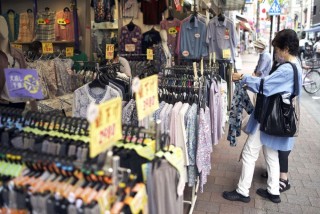Loading
Search
▼ Japan's Household Spending In October Falls 1.3% Amid Rising Prices
- Category:Other
Japan's household spending in October fell a real 1.3 percent from a year earlier, dropping for the third straight month, as consumers reduced purchases of food amid rising prices and clothing due to warm temperatures, government data showed Friday.
Separate data showed the country's inflation-adjusted wages remained flat in October compared with a year earlier after declining over the previous two months, as the impact of higher prices eased due partly to government subsidies for utility bills.
Average spending by households of two or more people stood at 305,819 yen, the Ministry of Internal Affairs and Communications said.
Food expenditure, which accounts for around 30 percent of spending, fell 0.8 percent, as consumers saved by buying chicken instead of pork and beef, while staying away from chocolate due to rising prices.
Spending on clothing and shoes plunged 13.7 percent, affected by weak demand for winter apparel amid unusually warm temperatures in the reporting month, the ministry said.
Outlays on housing including renovations dropped 10.7 percent, while education expenditures, such as tuition fees, fell 14.0 percent.
Household spending is a key indicator of consumer spending, which accounts for more than half of Japan's gross domestic product.
Meanwhile, the country's real wages at workplaces with five or more employees failed to turn positive in October after briefly rising in June and July but falling in August and September, the Ministry of Health, Labor and Welfare said.
Nominal wages, the average total monthly cash earnings per worker including base and overtime pay, increased 2.6 percent to 293,401 yen, rising for the 34th straight month.
At workplaces with 30 people or more employees, real wages, a barometer of consumer purchasing power, increased 0.9 percent, rising for the second consecutive month.
Consumer prices, used to calculate the salary data, rose 2.6 percent in October, slowing from 2.9 percent in September.
"While winter bonuses will be reflected in the November data, whether real wages will turn positive depends on price developments," a labor ministry official said.
Excluding bonuses and nonscheduled payments, average wages climbed 2.7 percent to 265,537 yen, the biggest rise in nearly 32 years. Full-time workers' average wages grew 2.8 percent to 336,070 yen, marking the sharpest increase since comparable data became available in 1994.
© KYODO
- December 7, 2024
- Comment (0)
- Trackback(0)


